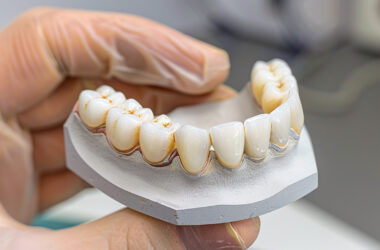Dental implants have dramatically improved tooth replacement, and made replaced teeth functional, long-lasting and pleasing to the eye. However, the cost of having a dental implant is still quite high, and normal, everyday folks are not able to pay out of pocket for it. Thus, they resort to their medical or dental care insurance for coverage and care benefits.
If you are considering having a dental implant anytime soon, then dental care insurance coverage from Blue Cross Medical Insurance is an option you should consider.
How well does Blue Cross Medical Insurance cover dental implants?
Medical insurance coverage varies from one provider to the next and also is dependent on the specifics of the plan you have bought. By understanding what your insurance covers, you will be able to plan for your dental care and avoid any unplanned expenses.
Also read: Cost of Dental Cleaning Without Insurance
In this article, we will provide you with all the information you will need about the dental care coverage provided by a Blue Cross medical insurance so that you can make an informed decision about your dental implants options.
A Brief Introduction to Dental Implants
Dental implants are false tooth roots fused into the jawbone. They act as support for replacement crowns, bridges, or dentures.
If you will be having an implant soon, you should expect to get it done in a three-stage process:
- Placement of the implant: A “post” made from titanium, will be surgically placed into your jawbone.
- Osseointegration: The post integrates or fuses naturally into and with your jawbone over many months and thus creates a strong foundation for subsequent implant materials that will be placed on it.
- Abutment and Crown Placement: As soon as the stable foundation is established, one or more abutments and crowns will be placed on top of the post to finalize your restoration.
Dental implants offer you a lot of benefits, including durability, as they are designed to last for several years if you take proper care of them; functionality and aesthetics, because your false teeth will look, feel, and function just like the rest of your natural teeth.
Introducing Blue Cross
Blue Cross is a major health insurance provider in the United States. Blue Cross offers several types of coverage plans to individuals and corporations. Some of the types of insurance coverage Blue Cross offers include medical, dental, and vision plans.
Dental coverage and medical coverage are two different types of coverage. While a dental insurance plan is designed specifically to address your oral health and preventive care, a medical insurance plan will take care of your access to general health services.
While any of the two coverage plans can provide you with access to dental implants, the details depend on your specific coverage plan and circumstances.
Also read: How to Get Dental Implants Covered by Medical Insurance
Blue Cross Dental Insurance vs. Medical Insurance Plans
So, does Blue Cross Medical Insurance cover dental implants? There is no single straightforward answer to the question of whether coverage for your dental implant will depend on the specific clauses in the Blue Cross dental or medical plan you have subscribed to.
The typical Blue Cross dental insurance plan will provide some coverage for general dental procedures although the extent of coverage may vary widely from one plan to the next. In fact, some Blue Cross dental insurance plans exclude implants altogether as the following infographic posted on this dental practice’s website shows.
Also, most of Blue Cross’s dental insurance plans have maximum annual or lifetime benefits for implant coverage. Per coverage, access is determined on a case-by-case basis, as elective dental implants will most likely not be covered.
Other details of Blue Cross’s dental insurance plan to take note of include the fact that about 50% to 60% of the cost of your dental implant will be covered if it is authorized and there might be a waiting period before you can access the procedure.
Lastly, you will need pre-authorization for your procedure. This process will entail you obtaining a treatment plan from your dentist and submitting same to Blue Cross for approval.
Take some time out to carefully review your Blue Cross dental insurance plan’s benefits and exclusions so that you will fully understand the extent of coverage that you have.
Also read: Full Mouth Dental Implants Cost With Insurance in 2024
Blue Cross Medical Insurance Plan
The typical Blue Cross medical insurance will not provide coverage for your routine dental procedures, including dental implants. Rather, the medical insurance will primarily focus on taking care of those treatments that are deemed “medically necessary.”
However, if your proposed dental implant is adjudged a medical necessity to treat a condition such as cancer of the mouth, congential defects, jawbone loss or trauma to your face, then a portion of the cost will be borne by your Blue Cross medical insurance plan. Do note that Blue Cross will require you to submit some documentation if this is the case.
It’s best practice that you carefully review the policy details of your Blue Cross medical insurance to ascertain the extent of the coverage you have for your proposed dental implant. Also, follow the due process for submitting a claim under your Blue Cross medical insurance plan. Have your dentist detail a treatment plan and submit it to Blue Cross along with your supporting documentation. Make a good case for the medical necessity of your proposed implant and proactively monitor the approval process, as you might be required to provide additional information and/or documentation.
Factors That Affect Your Dental Implant Coverage Under a Blue Cross Medical Insurance
Some factors will determine whether or not you have dental implant coverage under your Blue Cross medical insurance. Some of them are:
- The type of insurance you have bought: The specific type of medical insurance you have subscribed to will determine the extent of dental care coverage you will be able to access
- The specific clauses in your insurance: The benefits of each type of Blue Cross medical insurance policy vary in costs and benefits
- Medical expediency: In most cases, you will be required to demonstrate that your proposed dental implant is medically necessary
- Waiting period: It is likely that your Blue Cross medical insurance has clauses indicating a waiting period before you can access care
- Pre-authorization: There will be strict pre-authorization processes you will need to go through to access dental care under your Blue Cross medical insurance
How to Maximize Your Access to Dental Care
The following are steps you can take to increase your chances of obtaining dental implant care under your Blue Cross medical insurance and reduce your out-of-pocket cost:
- Do a Thorough Review of Your Insurance Policy: Get to understand the specifics of the Blue Cross medical insurance you have subscribed to
- Work With Your Dentist: This includes consulting with your dentist and working together to make a case for the medical necessity of your proposed implant
- Explore available financing: You might want to explore what financing options are available you if your medical insurance doesn’t cover 100% of the cost of your proposed dental implant. Some options you can look into include dental savings plans, health savings accounts (HSAs), or low-interest payment plans offered by dental providers.
- Access Alternative Treatments: You might want to consider having a bridge or denture implanted as a temporary treatment.
Also read: How Much Does Dental Bridge Cost With Insurance
Conclusion
Whether or not your Blue Cross medical insurance will cover your proposed dental implant requires that you carefully review your insurance plan and your specific circumstances.
Typically, your Blue Cross medical insurance will not cover routine dental care procedures like an implant unless it is deemed a medical necessity. Carefully review the options available to you and the extent of your personal resources to arrive at your dental implant treatment option.









